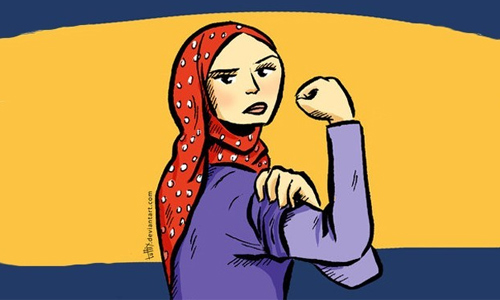Feminism is a form of collective movements that aim to establish the equal political, economic and social rights as well as equal opportunities for women in every walk of life. Feminism, as a movement emerged for recognition of the claims of women for rights legal, political and social equal to those possessed by men.
Feminism is a collection of movements and ideologies that share a common goal to achieve equal political, economic, cultural, personal, and social rights for women. It advocates men and women should be equal politically, economically and socially. The major concern of the collective movements of feminism is to deal with the problem women face in overcoming social barriers.
Feminism raises voices for the protection of women from domestic violence, sexual harassment in workplace including maternity leave, equal pay and against other forms of gender-specific discrimination against women.
Feminism emerged as a concept that can encompass both an ideology and a movement for socio-political change based on a critical analysis of male privilege and women’s subordination within a society.
Feminism began as a social movement in the late eighteenth century to achieve political equality for women. Over the years it has touched upon so many diverse disciplines and systems and thoughts. Feminist movement demanded freedom from male subjugation and control and asserted the women’s right to control their own bodies in reproduction and self-representation in society.
Islam plays a powerful role in determining both the actions and preferences of individuals as well as structures and patterns of communities. Islam is a complete system of thought that speaks on every question that one can face in the world, whether political, social, economic, familial, religious or personal.
In Islam, Musawah has been empowering women to understand and shape the interpretations, norms and laws that affect their lives and then push for legal reforms. Musawah announces itself as a global movement for equality and justice. Islamic feminism as a discourse to understand Muslim women is its pragmatic approach. It makes a cogent remark concerning the apparent incompatibility between Islamic ideology and social reality.
The vexed relationship between feminism and religious traditions is perhaps most manifesting in discussions on Islam. Islamic feminism refers to a feminist discourse and practice articulated within an Islamic paradigm” using the Quran and the teachings of the Prophet as its sources. In doing so, Islamic feminism helps Muslim men and women to achieve rights and justice.
Islamic feminism is a form of feminism concerned with the role of women in Islam. Islamic feminism argues for women’s rights from a religious standpoint. Islamic feminist thought demands respect for women and presents them with opportunities, both political and educational without compromise with their religious identity.
Islamic feminism is a movement of revisiting Islamic references in the Quran and Prophetic Tradition to prove the integral position of women’s rights therein and the extent of the gap between what these reference texts decree for women and the reality of women today.
Islamic feminism has elicited strong responses ranging from outright dismissal to enthusiastic approval from sections of the traditional establishment as well as some secular feminists. Islamic feminism does not seek to just criticize certain aspects of Islamic history that have placed men superior to women. Instead, Islamic feminism tries to find the pure message of Islam advocates gender equality described by the Quran.
Islamic feminists advocate women’s rights, gender equality and social justice grounded in an Islamic framework. Islamic feminism makes women realize their potential since they are encouraged to revisit the history of Islam and learn how Muslim women have actively contributed to society.
The aim of Islamic feminism is to seek Muslim women enough space to negotiate their own identities and express their independent existences as manifested in the Quran. One feature of Islamic feminism is the emphasis on Islamic values to justify gender equality, which they believe is inherent in Islam.
The Quran clearly states in the verses on creation that there is no ontological difference between man and woman, since both are created from a single origin. The Qur’an does not view women as inferior to men in terms of reaching moral perfection. The Quran establishes the equality between men and women in individual responsibility, value, reward and punishment, by declaring that both are at the same distance towards sins and good deeds.
Islamic Feminism is not critiquing or attacking or deconstructing Islamic history and hermeneutics, rather it seeks providing alternatives and seeking solutions inspired by Islamic values. Islamic feminism is not an exercise in isolation. Islamic feminism is only one amongst the many visions and interpretations of Islam.
Islamic feminism is a vehicle of liberation for many women just as secular feminism can be a vehicle for many others and it is equally unjust when any one of them is suppressed or ignored. Islamic feminism can be an alternative view of feminism, a view that can facilitate women’s emancipation in Islamic framework.
Islamic feminism may be the last hope in saving women from new cycles of marginalization in the name of religion, but it could also represent a model of alternative feminism to be followed by all the women in the world.
Home » Opinion » Why Islamic Feminism?
Why Islamic Feminism?
| Dr. Meraj Ahmad Meraj

